Great review Smartq V7
About this device on Habré already wrote . But first, somehow casually, and secondly, it was then about old (relative to the present) firmware of the device.
I have been using the gadget for more than 2 months and I can fully describe all its advantages and disadvantages. So, let's begin.

Technical specifications of the device have not changed - this is:
The device works under three operating systems, current versions for today:
Also, since the transition to the UBIFS file system for Android, the main boot loader has been changed (offering a choice of operating system). New devices are delivered immediately with it, for old ones it is proposed to download a set of utilities that update the bootloader. It is very simple to distinguish a new loader from an old one: the old one has a light blue background, the new one has a dark purple one. However, everything is in order.
The device is quite economical: in the box you will find the SmartQ V7 itself, an adapter with a flat plug, an HDMI Male-To-Male cable, and instructions in Chinese.
I also additionally bought a protective film on the screen.
')
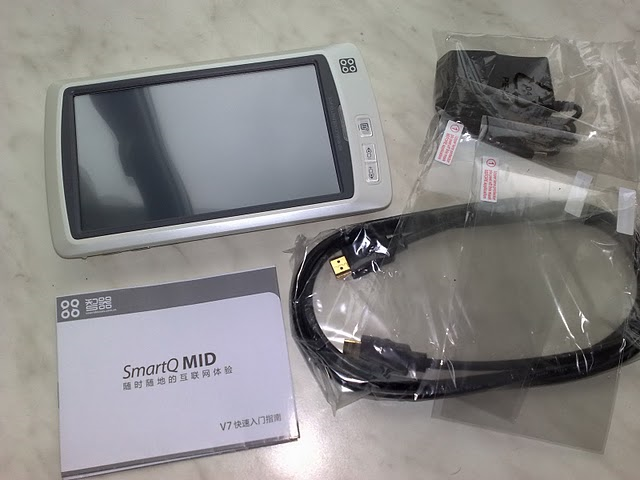
The plastic is pleasant to the touch, slightly rough at the back, thanks to which the device lies well and comfortably in the hands. There are no backlashes or squeaks, the tablet feels completely monolithic. The screen is slightly recessed into the front panel, as for me it is a big plus, because allows you to put the device "face down" on the table without fear of leaving a scratch. In general, the build quality is not satisfactory.
There are six hardware buttons on the device (not including reset) - three on the front panel and three more on top. The buttons change their functionality depending on the operating system and are therefore decorated with “neutral” icons that do not show a specific action.
In the case of the Android OS, the buttons on the front panel are: go to the top menu level or “step back” in the browser (“+” button), exit to the main menu or return to the desktop (“-” button), call the context menu or the main menu on the desktop (button with squares).
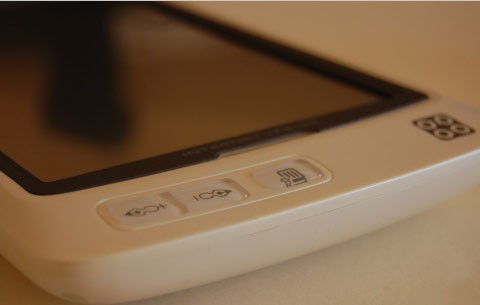
Behind the device is not flat, but slightly rounded, on the back side there are embossed grilles hiding the speakers, and a stand for installing the device vertically.
The stand itself seems very flimsy, made of thin plastic, but it performs its main function normally and is not going to break.
The top three buttons are the volume control / page turning in FBReader and the on / off / sleep button (for all OS). Nearby is a microphone jack.
On the side is the headphone output, it’s a composite video output, HDMI output, USB 2.0 port and a charger connector.
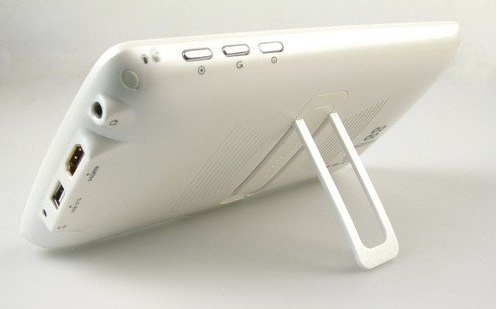
Bottom - a reset button and a slot for the stylus. Personally, I find it much more convenient to poke a screen with a stylus than with fingers, at least because the screen does not get dirty. Many complained about the "insensitive" touchscreen, but I do not see such a problem, perhaps it was about earlier versions of the device.
When you turn on the device, the main bootloader window will appear, prompting you to select an operating system:
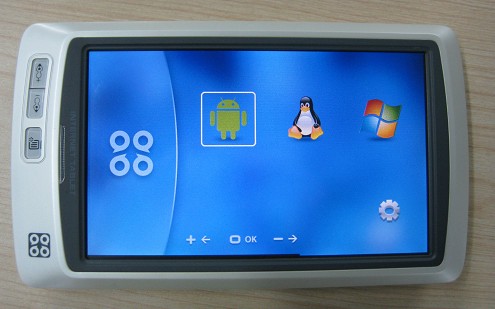
This is how the old bootloader looked, but the new one:

A full load of any OS takes less than a minute, Android starts faster.
Further, I will shift my review towards the operation of Android 2.1 on this device and here's why.
Windows CE, even the most “new” and non-Chinese, is still a long-obsolete OS. It is used mainly for navigation (yes, you can connect GPS via Bluetooth to SmartQ V7, roll up some iGo on Windows CE and get a car navigator with a record large screen) and play old toy ports (for example, you’ve recently played old Heroes of M & M) ).
Judging by the large and friendly community of SmartQ-linux coders, the presence of Russian adapted assemblies, as well as the development of their own Linux-firmware completely, this system appealed to many, but I personally found Ubuntu out of the box slowed down and not adapted for small screens (say, work in a text editor with a virtual keyboard enabled it is very inconvenient due to the fact that the keyboard, window title and all editor toolbars occupy 4/5 of the screen).
But many people like this OS, they use it and actively develop it.
I chose Android and use it as the main OS. This will be my story.
Android is most similar to a system that is ready to work out of the box, although of course a number of minor and not very edits are necessary.
The firmware that comes with the device had an English-language interface by default, but after flashing and installing updated versions, Android starts with the Chinese language by default. This annoying mistake was first introduced into a stupor, but after a brief googling, there was a manual describing how to switch the system language to Russian :)
Screen orientation is switched by a special utility, portrait or landscape - everyone chooses himself. The device is not equipped with a G-sensor, the craftsmen soldered it themselves and forced to work under Linux, but I did not see such projects under Android, and I never felt the need for a G-sensor.
The second (after installing the Russian language) fix was the reduction in the size of system fonts, windows and messages. By default, the Android interface is quite large, I would say too, but this option can be freely configured by changing the configuration file.
Next, Android just needs to root to get the ability to make other changes. The way to get root on Android has been around for a long time, described and documented by me step by step .
Along with the firmware comes the official Android Market application, but to make it work, you need a short but intense dance with a tambourine. In short - you need to get a unique androidID for your Google account on the Android emulator, and flash it into your device. Step by step instructions also exist .
Further "tuning" comes down to installing the Russian keyboard (I recommend RuKeyboard, since only it fully supports the Russian layout of the hardware USB keyboard), the removal of Chinese software (there is not much of it, but there is) and the telephone part (Phone.apk and TelephonyProvider.apk - not make sense on the tablet, but they put the battery in the background), and install the software you need.
I limited myself to a launcher (Launcher Pro), a browser (SkyFire), a book reader (FBReader), video (Act 1) and audio (Meridian) players, a text editor, an ICQ client and a number of other utilities (task manager, backup, utilities for YouTube and streaming video).
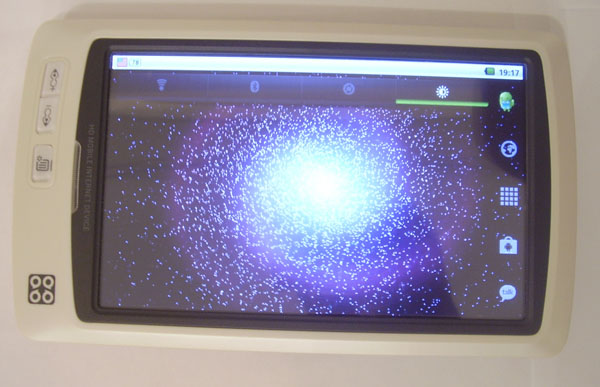
Desktop with Launcher Pro and included animated wallpapers.
After all the manipulations (and before them, to be honest), the device works nicely-quickly, plays all the videos that came to hand (up to 2.4 GB DivX rips, Xvid, MPEG-4, and 720p MKV (AC3, H. 254) films). Video 1080p is also played, but with some brakes, it is quite possible it is treated by the selection of the player, but I see no reason to watch 1080p on a 7-inch screen, the poet did not deal with this issue.
Composite and HDMI outputs work, although composite gives a slightly “green” and blurred picture to the big screen, but via an HDMI connection it is quite possible to watch movies from the device on the TV. Again, the video goes without brakes and freezes.
USB port is not buggy in the new firmware. Understands all the flash drives that were found, keyboard, mouse, 3G-modem (Huawei e1550 and some other modems of this manufacturer work for sure, but in general - not all 3G modem models are supported, but it is possible to set up a connection with a mobile phone via Bluetooth and use its as a modem).
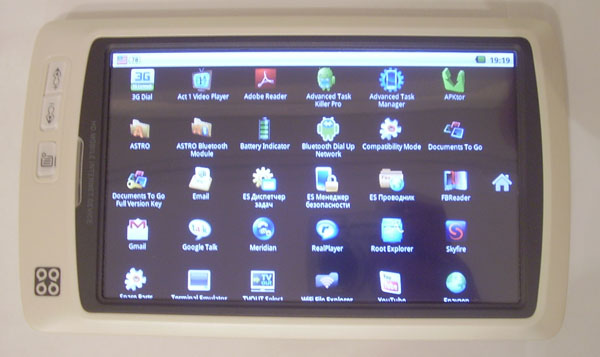
Program menu.
The browser is fast, supports Java scripts and Ajax, flash video is automatically sent to a separate player (YouTube.apk or a player selected by the user). With Youtube RolleMod Downloader, videos from this service can not only be watched but also saved to an SD card.
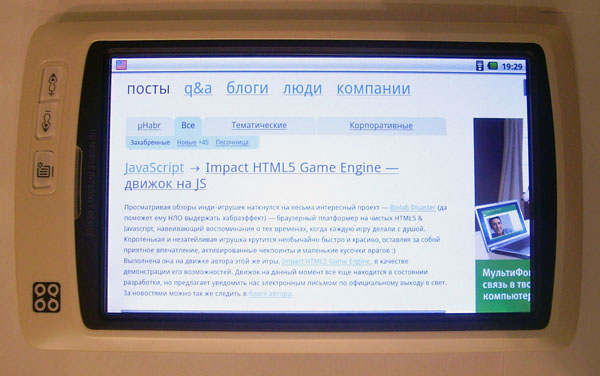
Browser.
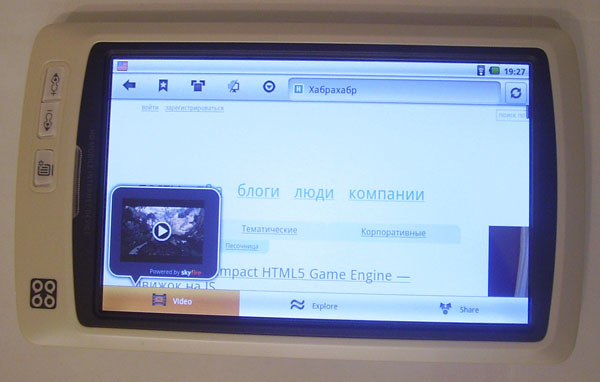
Browser kindly offers to view the embedded video on the page.
Audio player (Meridian) plays mp3, ogg, 3gp. Able to work with tags and play in the background. As for me - the best choice player. Headphone sound is very good, clean and noise free. Built-in speakers provide a good loud stereo, enough to watch movies.
Books are read through FBReader, look great, scroll quickly. PDF Viewer - via Documents to Go or Adobe Reader for Android. Both perfectly draws PDF, works correctly with Cyrillic and does not slow down, which is important.
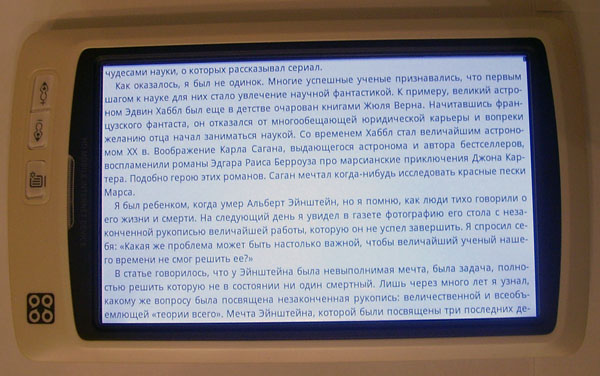
FBReader in fullscreen mode.

PDF (scanned book) open Abode Reader.

Fragmented PDF slice.
Some DJVu-Droid was found for Djvu, but it slows down quite unpleasantly, maybe in another browser it will be more fun.
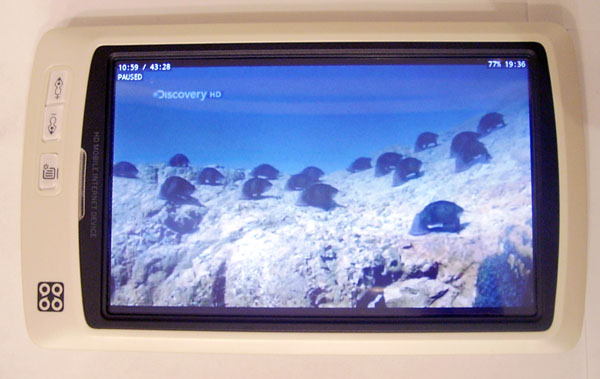
Video player TV-Rip 700 Mb.
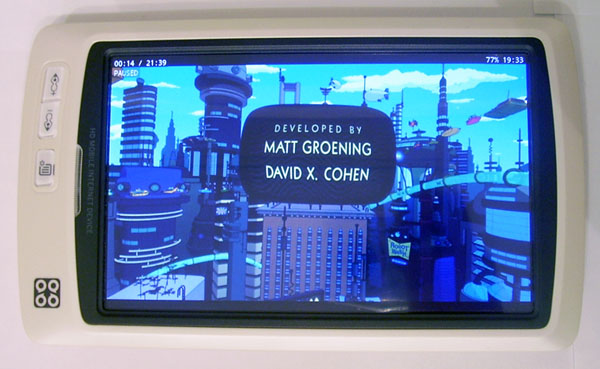
Video player HDTV-Rip, MKV H.264.
The latest firmware also fixed the problems of Wi-Fi, now the connection is stable and does not break.
Let's summarize the advantages of Android and go to the disadvantages:
Of course, not everything is so perfect on Android, there are drawbacks :
As for the pros and cons of the device as a whole, after reading reviews here and on other forums about various Chinese tablets, I dare to say that this is one of the best tablet PCs among little-known Chinese brands.
As I said, he has:
Among the serious shortcomings so far I see only a non-working microphone, the lack of software support for many 3G modems and a 3D accelerator, poor video quality through a composite (not HDMI) output.
On this, I think it's time to finish my review, there will be questions - ask :)
PS
All the pictures used in the article were found on the Internet; I didn’t take pictures of my device, because there are so many of them on the net.
* It is suggested that the Chinese started asking for $ 22.65 for delivery. When I bought the device, it cost $ 190 and no additional fees were charged, now, apparently, we are witnessing clever Chinese marketing, when ordering through the paper, almost $ 23 is added to the cost of the device and the final cost is $ 177.65
UPD
Added some pictures of dubious quality, but his own :)
I have been using the gadget for more than 2 months and I can fully describe all its advantages and disadvantages. So, let's begin.

Technical specifications of the device have not changed - this is:
- 7-inch resistive screen, with a resolution of 800x480;
- Built-in Bluetooth 2.0, Wi-Fi 802.11b / g, USB Host / OTG;
- Chipset Telechips TCC8900 with a TCC8901 processor operating at a frequency of 600 megahertz, 256MB DDRII, 2GB of non-volatile memory;
- HDMI, composite, 3.5 mm outputs, built-in microphone, SDHC card reader;
- Li-Pol battery at 4500 mAH;
- Dimensions: 200x120x24, 480 grams;
The device works under three operating systems, current versions for today:
- Android 2.1 V2 - multilanguage, incl. and Russian;
- Ubuntu Linux 5.5 - English;
- Windows CE 6 - English version (it used to be Chinese);
Also, since the transition to the UBIFS file system for Android, the main boot loader has been changed (offering a choice of operating system). New devices are delivered immediately with it, for old ones it is proposed to download a set of utilities that update the bootloader. It is very simple to distinguish a new loader from an old one: the old one has a light blue background, the new one has a dark purple one. However, everything is in order.
The device is quite economical: in the box you will find the SmartQ V7 itself, an adapter with a flat plug, an HDMI Male-To-Male cable, and instructions in Chinese.
I also additionally bought a protective film on the screen.
')

The plastic is pleasant to the touch, slightly rough at the back, thanks to which the device lies well and comfortably in the hands. There are no backlashes or squeaks, the tablet feels completely monolithic. The screen is slightly recessed into the front panel, as for me it is a big plus, because allows you to put the device "face down" on the table without fear of leaving a scratch. In general, the build quality is not satisfactory.
There are six hardware buttons on the device (not including reset) - three on the front panel and three more on top. The buttons change their functionality depending on the operating system and are therefore decorated with “neutral” icons that do not show a specific action.
In the case of the Android OS, the buttons on the front panel are: go to the top menu level or “step back” in the browser (“+” button), exit to the main menu or return to the desktop (“-” button), call the context menu or the main menu on the desktop (button with squares).

Behind the device is not flat, but slightly rounded, on the back side there are embossed grilles hiding the speakers, and a stand for installing the device vertically.
The stand itself seems very flimsy, made of thin plastic, but it performs its main function normally and is not going to break.
The top three buttons are the volume control / page turning in FBReader and the on / off / sleep button (for all OS). Nearby is a microphone jack.
On the side is the headphone output, it’s a composite video output, HDMI output, USB 2.0 port and a charger connector.

Bottom - a reset button and a slot for the stylus. Personally, I find it much more convenient to poke a screen with a stylus than with fingers, at least because the screen does not get dirty. Many complained about the "insensitive" touchscreen, but I do not see such a problem, perhaps it was about earlier versions of the device.
When you turn on the device, the main bootloader window will appear, prompting you to select an operating system:

This is how the old bootloader looked, but the new one:

A full load of any OS takes less than a minute, Android starts faster.
Further, I will shift my review towards the operation of Android 2.1 on this device and here's why.
Windows CE, even the most “new” and non-Chinese, is still a long-obsolete OS. It is used mainly for navigation (yes, you can connect GPS via Bluetooth to SmartQ V7, roll up some iGo on Windows CE and get a car navigator with a record large screen) and play old toy ports (for example, you’ve recently played old Heroes of M & M) ).
Judging by the large and friendly community of SmartQ-linux coders, the presence of Russian adapted assemblies, as well as the development of their own Linux-firmware completely, this system appealed to many, but I personally found Ubuntu out of the box slowed down and not adapted for small screens (say, work in a text editor with a virtual keyboard enabled it is very inconvenient due to the fact that the keyboard, window title and all editor toolbars occupy 4/5 of the screen).
But many people like this OS, they use it and actively develop it.
I chose Android and use it as the main OS. This will be my story.
Android is most similar to a system that is ready to work out of the box, although of course a number of minor and not very edits are necessary.
The firmware that comes with the device had an English-language interface by default, but after flashing and installing updated versions, Android starts with the Chinese language by default. This annoying mistake was first introduced into a stupor, but after a brief googling, there was a manual describing how to switch the system language to Russian :)
Screen orientation is switched by a special utility, portrait or landscape - everyone chooses himself. The device is not equipped with a G-sensor, the craftsmen soldered it themselves and forced to work under Linux, but I did not see such projects under Android, and I never felt the need for a G-sensor.
The second (after installing the Russian language) fix was the reduction in the size of system fonts, windows and messages. By default, the Android interface is quite large, I would say too, but this option can be freely configured by changing the configuration file.
Next, Android just needs to root to get the ability to make other changes. The way to get root on Android has been around for a long time, described and documented by me step by step .
Along with the firmware comes the official Android Market application, but to make it work, you need a short but intense dance with a tambourine. In short - you need to get a unique androidID for your Google account on the Android emulator, and flash it into your device. Step by step instructions also exist .
Further "tuning" comes down to installing the Russian keyboard (I recommend RuKeyboard, since only it fully supports the Russian layout of the hardware USB keyboard), the removal of Chinese software (there is not much of it, but there is) and the telephone part (Phone.apk and TelephonyProvider.apk - not make sense on the tablet, but they put the battery in the background), and install the software you need.
I limited myself to a launcher (Launcher Pro), a browser (SkyFire), a book reader (FBReader), video (Act 1) and audio (Meridian) players, a text editor, an ICQ client and a number of other utilities (task manager, backup, utilities for YouTube and streaming video).

Desktop with Launcher Pro and included animated wallpapers.
After all the manipulations (and before them, to be honest), the device works nicely-quickly, plays all the videos that came to hand (up to 2.4 GB DivX rips, Xvid, MPEG-4, and 720p MKV (AC3, H. 254) films). Video 1080p is also played, but with some brakes, it is quite possible it is treated by the selection of the player, but I see no reason to watch 1080p on a 7-inch screen, the poet did not deal with this issue.
Composite and HDMI outputs work, although composite gives a slightly “green” and blurred picture to the big screen, but via an HDMI connection it is quite possible to watch movies from the device on the TV. Again, the video goes without brakes and freezes.
USB port is not buggy in the new firmware. Understands all the flash drives that were found, keyboard, mouse, 3G-modem (Huawei e1550 and some other modems of this manufacturer work for sure, but in general - not all 3G modem models are supported, but it is possible to set up a connection with a mobile phone via Bluetooth and use its as a modem).

Program menu.
The browser is fast, supports Java scripts and Ajax, flash video is automatically sent to a separate player (YouTube.apk or a player selected by the user). With Youtube RolleMod Downloader, videos from this service can not only be watched but also saved to an SD card.

Browser.

Browser kindly offers to view the embedded video on the page.
Audio player (Meridian) plays mp3, ogg, 3gp. Able to work with tags and play in the background. As for me - the best choice player. Headphone sound is very good, clean and noise free. Built-in speakers provide a good loud stereo, enough to watch movies.
Books are read through FBReader, look great, scroll quickly. PDF Viewer - via Documents to Go or Adobe Reader for Android. Both perfectly draws PDF, works correctly with Cyrillic and does not slow down, which is important.

FBReader in fullscreen mode.

PDF (scanned book) open Abode Reader.

Fragmented PDF slice.
Some DJVu-Droid was found for Djvu, but it slows down quite unpleasantly, maybe in another browser it will be more fun.

Video player TV-Rip 700 Mb.

Video player HDTV-Rip, MKV H.264.
The latest firmware also fixed the problems of Wi-Fi, now the connection is stable and does not break.
Let's summarize the advantages of Android and go to the disadvantages:
- The system loads and runs fast;
- The effects of the transition between the windows are smooth and beautiful;
- You can make the Android Market work;
- High-quality Russian interface, plug-in Russian input, support for hardware keyboard;
- Most movie formats are played out of the box, the video does not slow down;
- Good sound quality, there is a convenient player;
- Browser - fast, read PDF and regular books - convenient, streaming video works well;
- You can connect a 3G modem (not everyone), use a mobile as a modem (almost everything), a stable Wi-Fi connection;
- The manufacturer often updates the firmware, promises support for Android 2.2, there are many amateur builds and firmware, as well as tools that allow you to modify or assemble your firmware.
Of course, not everything is so perfect on Android, there are drawbacks :
- Until now, the built-in microphone is not working (either on Skype, not in notes, anywhere, although it definitely is soldered);
- In the new firmware there is a glitch with a sleeping mode - sometimes the device does not come out of it and you have to reboot it with a reset (there are a number of drugs against this glitch and there is hope that this will be fixed in the next firmware);
- Untrained user will have to spend about a day to google, read and configure the device (reduce font sizes, get root-access, enable android-market, remove extra software);
- After updating the firmware, the default language is Chinese and it is necessary, swearing, change to Russian;
- The user has only 70 MB of space to install programs on Android (to be honest, this was more than enough, and who didn’t have enough - they found a way to remove Linux and mount its partitions on Android. The result was a device with two operating systems - Android and Win CE, Adnroid got 700-mb places for programs as well as 128-mb swap-a);
- The device has a 3D accelerator, but it is not yet programmed, so most 3D games do not work or slow down on V7.
As for the pros and cons of the device as a whole, after reading reviews here and on other forums about various Chinese tablets, I dare to say that this is one of the best tablet PCs among little-known Chinese brands.
As I said, he has:
- Good build quality;
- Your own design;
- A long time (I didn’t manage to “plant” the device in one day, it’s enough for 5-6 hours with Wi-Fi turned on or 4-5 hours for video, but to read books with Wi-Fi turned off and with minimum brightness can not one long winter evening);
- There is a large Russian-speaking community of SmartQ waters , where they will help you, guide you and guide you on the right path;
- Developer Support - regular firmware updates;
- There are many amateur firmware and modifications for all 3 wasps for every taste;
- The device lends itself well to hardware modding (the owners successfully solder USB hubs, 3G modems and G-sensors);
- Maximum compliance of the declared capabilities with real functionality;
- Low price - the device can be bought for only $
155* $ 177.65 from an authorized representative (including shipping costs).
Among the serious shortcomings so far I see only a non-working microphone, the lack of software support for many 3G modems and a 3D accelerator, poor video quality through a composite (not HDMI) output.
On this, I think it's time to finish my review, there will be questions - ask :)
PS
All the pictures used in the article were found on the Internet; I didn’t take pictures of my device, because there are so many of them on the net.
* It is suggested that the Chinese started asking for $ 22.65 for delivery. When I bought the device, it cost $ 190 and no additional fees were charged, now, apparently, we are witnessing clever Chinese marketing, when ordering through the paper, almost $ 23 is added to the cost of the device and the final cost is $ 177.65
UPD
Added some pictures of dubious quality, but his own :)
Source: https://habr.com/ru/post/106239/
All Articles